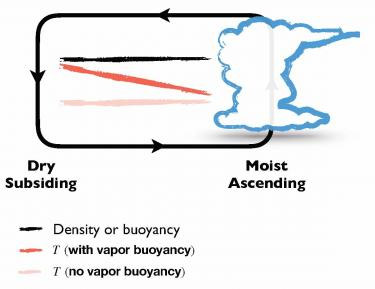The Lightness of Water Vapor Buffers Climate Warming in the Tropics
Conventional knowledge has it that warm air rises while cold air sinks. But a study from Prof. Da Yang’s group found that in the tropical atmosphere, cold air rises due to an overlooked effect -- the lightness of water vapor. This effect helps to stabilize tropical climates and buffer some of the impacts of a warming climate.
The study, published on May 6, 2020 in the journal Science Advances, is among the first to show the profound implications water vapor buoyancy has on Earth’s climate and energy balance.
UC Davis Press Release: https://www.ucdavis.edu/news/cold-air-rises-what-means-earths-climate
Link to the study:
Seth D. Seidel, Da Yang. The lightness of water vapor helps to stabilize tropical climate. Science Advances, 2020; 6 (19): eaba1951 DOI: 10.1126/sciadv.aba1951
https://advances.sciencemag.org/content/6/19/eaba1951

This graphic illustrates the vapor buoyancy effect, in which cold, humid air rises because it is lighter than dry air. (Da Yang/UC Davis)

